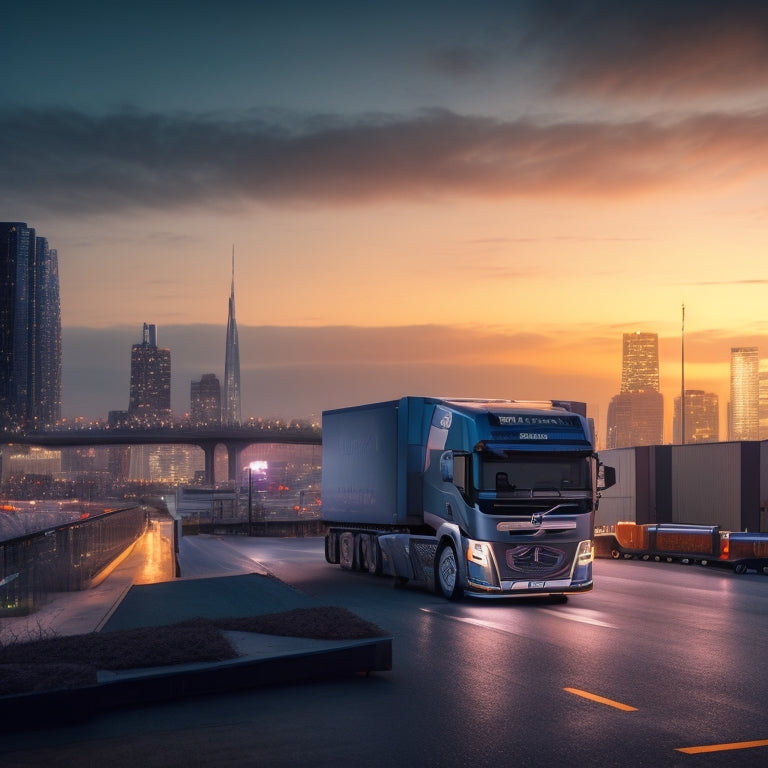
Volvo VNR Electric Revolutionizes Last-Mile Deliveries
Share
The Volvo VNR Electric is transforming last-mile deliveries by offering a sustainable and efficient solution for logistics companies. By integrating electric vehicles into their operations, companies can reduce their environmental footprint while optimizing routes and streamlining logistics. This collaborative effort with Volvo Trucks North America provides resources for fleet electrification and guarantees a seamless shift to electric vehicles. With a range of up to 240 miles and zero emissions, the Volvo VNR Electric is poised to revolutionize the logistics industry, paving the way for a cleaner, healthier future - and that's just the beginning of the electric journey.
Key Takeaways
• The Volvo VNR Electric optimizes routes and streamlines logistics for last-mile deliveries, enhancing operational efficiency.
• With a range of up to 240 miles, the Volvo VNR Electric reduces the need for frequent recharging, making it ideal for last-mile deliveries.
• The electric truck's zero-emission operation improves local air quality and public health, aligning with California's clean air goals.
• The Volvo VNR Electric's fast charging time of 70 minutes enables quick turnaround times, minimizing downtime and increasing productivity.
• Widespread adoption of the Volvo VNR Electric can revolutionize the logistics industry, contributing to a cleaner, healthier future for last-mile deliveries.
Volvos Electric Fleet Takes Shape
With the deployment of the Volvo VNR Electric, Quality Custom Distribution (QCD) takes a crucial step towards electrifying its fleet of over 700 vehicles, marking an important milestone in the shift to sustainable last-mile deliveries. This development signals a deliberate effort to expand QCD's fleet, enhancing operational efficiency while reducing environmental impacts.
As QCD continues to grow its fleet, the incorporation of electric vehicles will play a pivotal role in optimizing routes and streamlining logistics. By integrating the Volvo VNR Electric, QCD is poised to improve its overall operational efficiency, paving the way for a more sustainable future.
This strategic move aligns with the company's commitment to reducing emissions and promoting eco-friendly practices in the logistics industry.
Partnership Paves Way for Success
Through a collaborative partnership with Volvo Trucks North America, QCD gains access to the resources and support necessary to successfully integrate the Volvo VNR Electric into its fleet, ensuring a smooth shift to electric vehicles.
This partnership benefits QCD by providing a complete electrification ecosystem, including maintenance services from TEC Equipment, to maximize vehicle uptime. The Volvo LIGHTS project offers additional resources, facilitating a seamless switch to electric vehicles.
This partnership paves the way for QCD's fleet electrification, enabling the company to reduce its environmental footprint while maintaining operational efficiency.
Electric Trucks in Action
As QCD begins deploying the Volvo VNR Electric on last-mile delivery routes in Southern California, the truck's performance will be closely monitored to assess its capabilities in real-world operating conditions. This real-world testing will provide valuable insights into the truck's battery technology, operational efficiency, and overall performance. The data collected will help identify ideal routes for integrating more electric trucks into QCD's fleet.
| Metric | Volvo VNR Electric | Traditional Diesel |
|---|---|---|
| Range | Up to 240 miles | N/A |
| Charging Time | 70 minutes (150 kW) | N/A |
| Emissions | Zero Emissions | 26.4 tons CO2e/year |
Environmental Impact and Benefits
By adopting the Volvo VNR Electric, QCD is positioned to significantly reduce its environmental footprint, aligning with California's ambitious clean air goals and supporting the state's efforts to mitigate the adverse health effects of air pollution.
This shift to electric vehicles will yield substantial sustainability benefits, including reduced greenhouse gas emissions and air pollutants. The Volvo VNR Electric's zero-emission operation will contribute to a cleaner environment, improving local air quality and public health.
In addition, QCD's commitment to electrification demonstrates a strong dedication to environmental responsibility, showcasing the company's commitment to minimizing its ecological impact.
A Cleaner Future in Sight
The widespread adoption of electric vehicles like the Volvo VNR Electric is poised to revolutionize the logistics industry, paving the way for a cleaner, healthier future.
With the increasing demand for sustainable transportation, electric vehicles are becoming an essential component of the clean energy landscape.
The Volvo VNR Electric, with its zero-emission capabilities, is a notable step towards reducing greenhouse gas emissions and improving air quality.
As the logistics industry continues to shift towards clean energy, electric vehicles will play a crucial role in creating a more sustainable future.
Frequently Asked Questions
How Does the Volvo VNR Electric's Range Affect Delivery Route Planning?
The Volvo VNR Electric's range necessitates optimized route planning, incorporating delivery scheduling and fleet management strategies to maximize energy efficiency, while implementing tailored charging strategies to minimize downtime and guarantee seamless last-mile delivery operations.
What Safety Features Does the Volvo VNR Electric Offer for Drivers?
The Volvo VNR Electric incorporates advanced safety features, including Driver Monitoring systems to detect fatigue and distraction, and scheduled Safety Inspections to maintain peak vehicle performance, guaranteeing a secure driving experience for operators.
Can the Volvo VNR Electric Be Charged Using Renewable Energy Sources?
Like a seamless puzzle piece, the Volvo VNR Electric can be charged using renewable energy sources, such as solar or wind power, by leveraging the Renewable Grid and Energy Harvesting technologies, ensuring a sustainable and environmentally friendly charging process.
How Does the Volvo LIGHTS Project Address Charging Infrastructure Needs?
The Volvo LIGHTS project addresses charging infrastructure needs by investing in public access Charging Hubs, enhancing grid capacity, and collaborating with urban planning authorities to guarantee seamless integration and efficient infrastructure development.
Will QCD Consider Retrofitting Existing Trucks With Electric Powertrains?
QCD may consider retrofitting existing trucks with electric powertrains, weighing cost benefits against fleet upgrades, potentially leveraging battery swap technology to enhance performance and boost operational efficiency.
Related Posts
-

Why Vertical Gardens Reduce Home Energy Consumption
By incorporating a vertical garden into your home design, you'll reduce energy consumption through natural insulation...
-

10 Eco-Friendly Air Management Tools for Clean Home Living
You're taking an essential step towards creating a healthier living space by seeking eco-friendly air management tool...
-

10 Powerful Electric Mowers for Expansive Lawns
You're moving away from gas-powered mowers and exploring electric options for your expansive lawn. You'll find that h...


